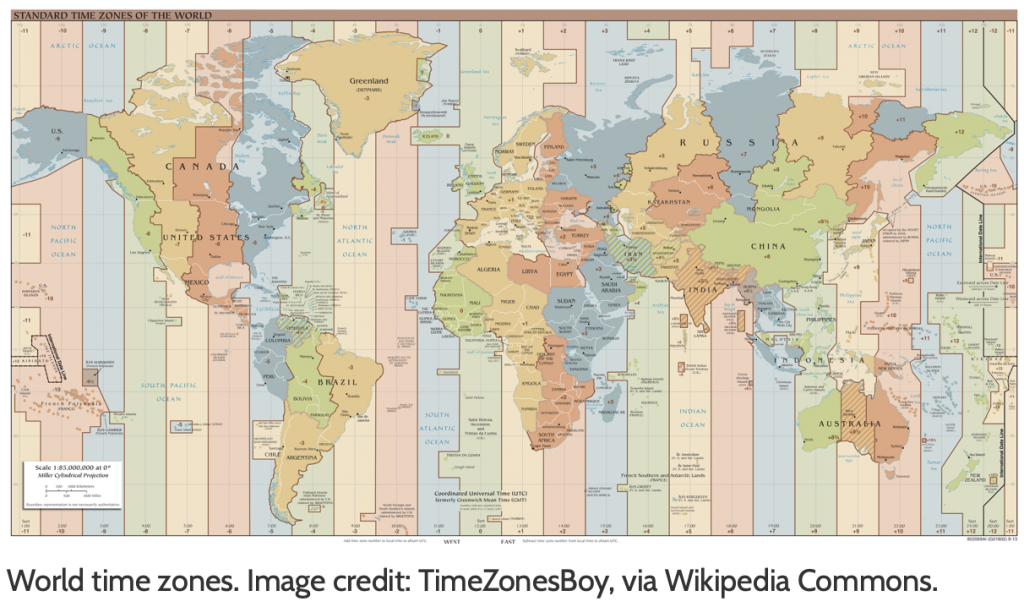
Time is a human construct, so being humans, we should be able to bend time to our will. As it turns out, we actually are! If the daylight savings time experiment has taught us anything, it is that we humans can be flexible in our interpretation and in our experience of time.
Changing back and forth twice a year between summer time and “natural” time has been the burden of humans for almost half a century now. But what we really did was conduct a great experiment of cutting off one end of the blanket and sewing it on at the other end. This is quite unnecessary and it cannot be very productive to constantly disorient humans with respect to time. As a matter of fact, the European Parliament has come to the conclusion that the summer time experiment should finally be abandoned.
I believe what really should be abandoned though is our inflexible, almost pedantic, attitude with regard to time zones and timekeeping devices. As it is, we are dividing the surface of the planet into different east/west zones that are delineated by hard, straight lines. There are 24 of those zones, one for every hour of the day, and they divide the world much like a political map. A little exception here and there, but in the main our conception of time has been rigidly geometric and it has been rather divisive.

Larger time zones?
The Chinese have shown that a more flexible approach to time is possible. In 1949 they ended the division of their country into different time zones. Everyone in China observes Beijing time, despite the fact that the east/west extension of that country would suggest it be divided into five different timezone slices…
Historically, an empire was said to be great when one could say “the sun never sets” within its borders. That may be a bit of an exaggeration, but it does show us a way forward, suggesting a way out of rigid time divisions and perhaps it helps to end the summer time experiment. We could apply the old empire logic to entire continents, for example, and shape our experience of time in a kind of “continental model”.
Let’s say we have “Europe/Africa time” and all the different countries in that space apply it, period. We could have an “Americas time” and everywhere on the vast American continent, countries observe that time. Or perhaps there could be two, Americas east and Central, and Americas West. “Eurasia time” could connect Eastern Europe and the Middle East, then “Asia time” and “Pacific time” could be other zones of common time experience.
The lines of such a time subdivision would perhaps be more flowing, less rigidly rectangular and in the end there would definitely be a smaller number of time zones. Eight of such extended time zones should be quite sufficient. Perhaps some countries such as Iceland and Greenland would like to establish “Atlantic Time”, but they might also opt to join either the Americas or the Europe/Africa time zone. The Portuguese islands of the Azores, which are located in the middle of the Atlantic, should probably be in the same time zone as the Portuguese mainland, be that Europe/Africa time or perhaps a Western Europe/Atlantic time zone.
The idea is that time zones, instead of dividing people along rigid lines, could be used to unite larger numbers of us in a common time experience. This is not so much a prescription of how to divvy up the world time wise as it is an appeal to be more flexible in our approach to time, using time to unite, instead of to divide.
The Portuguese example

What originally brought me to think about time and its flexibility was the recent time change (we’re in the spring of 2021) where here in the Azores, like everywhere else, an hour was cut off the morning light, only to sew it on to the evening side of the blanket. So instead of the sun coming up at 7, it now comes up at 8, and instead of setting at 7 it now sets at 8. Some people like it, some don’t, but the fact of the matter is that all that constant changing back and forth is unnecessary.
My thought in that connection was that “with Portugal mainland only one hour distant in time, the Azores might just as well close that gap and join mainland time, with no ill effect”. Actually not only no ill effect, but a decidedly positive effect of uniting the country in one time conception, with all the benefits this would bring for commerce and communication.
Starting out with that thought, the inherent flexibility of our time conception, the malleability of time in human hands, gradually came into better focus. We might as well assert dominance over time, instead of artificial time divisions or time zones rigidly ruling our every action.
Just musings?
Will those thoughts to be of any use or are they just idle musings that will have no tangible effect? Well it all depends on us. Certainly a different system of seeing time cannot be imposed by fiat. There would be all kinds of resistance just for the sake of resistance.
All that can be put out there is the idea. Someone could work out a tentative scheme and throw it out there for discussion. Countries could join under a continental time designation. As more countries follow a common time zone, others will aggregate just because it “feels natural”. And so it could come into being. Just by itself, and because it is easier than being all rigid about time.
Sepp Hasslberger
Terceira, Azores
April 2021
References and Resources
Quote found at https://www.brainyquote.com/authors/tillie-olsen-quotes
European Parliament on ending time change…
“Parliament backs proposal to end switch between summer and winter time in 2021”
https://www.europarl.europa.eu/news/en/press-room/20190321IPR32107/parliament-backs-proposal-to-end-switch-between-summer-and-winter-time-in-2021
Picture of time zones map found at https://earthsky.org/upl/2016/02/Standard_World_Time_Zones.png
https://en.wikipedia.org/wiki/Time_in_China
Arrticle first published here:
http://www.hasslberger.com/emerging-humanity/the-flexibility-of-time/

